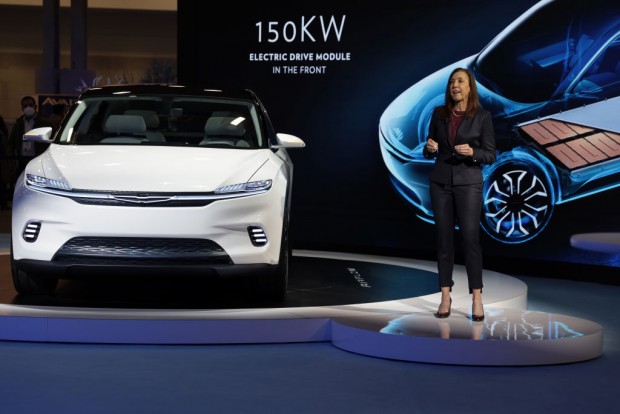LAS VEGAS, NEVADA - Chris Feuell, CEO of Chrysler brand of Stellantis, introduces the all-electric Chrysler Airflow Concept vehicle during a Stellantis press event at CES 2022 at the Las Vegas Convention Center on January 5, 2022 in Las Vegas, Nevada.
(Photo : Alex Wong/Getty Images)
Stellantis CEO Carlos Tavares expressed his displeasure with the number of electrification and emissions regulations across the globe, particularly in the EU, telling European newspapers in a joint interview that "electrification is a technology chosen by politicians, not by industry."
Automotive News reported Tavares' scrum with the European media, with the Stellantis boss adamant that the governments' insistence on rushing electrification would come with risks. He aimed at Europe's impending ban on internal combustion engines by the year 2035, describing it as brutal and a regulation that could create social risk.
Tavares insists that rushing electrification is risky
Tavares' statement comes when numerous governments have identified electric vehicles and batteries as the main solution in driving down carbon emissions in the transportation sector. Tavares pointed out that carmakers have better alternatives to drive down emissions which would cost less than producing EVs and batteries.
Tavares cited light hybrids as vehicles that would yield fewer emissions than electric vehicles. This would be cheaper not only for automakers to manufacture but also for customers to buy. Tavares argued that "given the current European energy mix, an electric car needs to drive 70,000 kilometers (44,000 miles) to compensate for the carbon footprint of manufacturing the battery." Tavares has a solid point as manufacturing of batteries at this stage produces a significant source of emissions, with each electric vehicle yielding its own carbon footprint.
Tavares just celebrated his first year as chief executive of Stellantis; a company formed last year through the merger of France's PSA Group and Fiat Chrysler Automobiles. Stellantis sells cars, SUVs, and trucks under 14 different brands, including Jeep, Chrysler, Citroën, Peugeot, Dodge, Fiat, and Ram.
Related Article: 1965 Ford Mustang Shelby GT350R Nets Record $4 Million at Auction: Most Valuable Mustang Again
Stellantis, a latecomer when it comes to electrification
Stellantis has some catching up to do when it comes to electrification, with the company offering just 18 different electric models across their brands. Almost all EVs are sold in Europe, with Stellantis introducing electric versions of gasoline-powered crossovers, vans, and cars.
Stellantis announced last year that it would invest more than 30 billion euros through 2025 for the electrification of its vehicle lineup. All 14 brands under Stellantis should have an electric vehicle by 2025. Stellantis plans to introduce 20 electrified nameplates by the end of next year and turn Alfa Romeo and Lancia into heavily electrified brands as soon as 2027.
Stellantis will announce a more detailed strategy on March 1, 2022. It will be interesting to see what the company's electrification plans are in the near future. Stellantis has already laid out some of its plans this year, with the company announcing earlier this month at the Consumer Electronics Show in Las Vegas that Chrysler will become a fully electric car brand in the year 2028.
READ MORE ON AWN:
China's Auto Sales Grow for First Time Since 2017; Climb 3.8% In 2021 With 26.28 Million Units Sold
Shakeup at Tesla as Company's Top Black Executive Steps Down as HR Chief
See Now: OnePlus 6: How Different Will It Be From OnePlus 5?




























